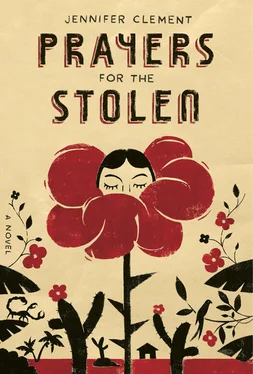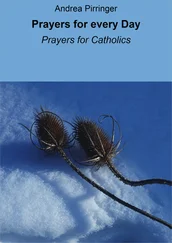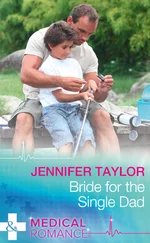That year was also measured by watching my mother’s blond hair grow out. By the time the school year was over, her black roots reached almost to her ears. She never dyed it over black, touched it up blond again, or even trimmed it, because Ruth’s beauty salon had closed. And this, the closing of Ruth’s salon, was the third event of that year.
No one saw a thing. No one heard a thing. Nothing was left behind.
We never heard from Ruth again.
Estefani’s grandmother, Sofia, who ran the OXXO convenience store down the block from Ruth’s salon, had risen earlier than usual to go and open her place. It was December tenth. Sofia was expecting the swarms of pilgrims that would pass by her store, and march down all of Mexico’s dirt roads and highways, to get to Mexico City for the Virgin of Guadalupe’s day, on December twelfth.
Sofia walked past the beauty salon as she did every day. The door made of corrugated transparent green plastic was swinging wide open into the street. She peered inside and called Ruth’s name, but there was no answer.
Later she would explain that she could never tell if those bright red spots on the floor were blood or drops of red nail polish.
Nobody did anything as stupid as calling the police. Instead we waited.
When we walked past the beauty parlor that still had its sign The Illusion over the front door, we’d peer in and hope to still see her there. Instead, we only saw two standing hairdryers that our mothers used to sit under and the two empty sinks where Ruth used to wash our hair. The menorah on the windowsill was still there in front of the window that was starred with bullet holes.
We all knew she was stolen.
There are so many dead people out there we’re never going to find them alive, my mother said.
José Rosa was so disturbed by the disappearance of Ruth that he spent two months trying to get someone to come from Mexico City to investigate.
There was only one place on that mountain where our cell phones could get a signal from a tower that was twelve kilometers away. This was in a small clearing on the way to school. There was always someone there either talking on their phone or waiting to get a call from a relative in the United States. The clearing was our link to the world. It was here that good news and bad news reached us. My mother named the place Delphi, after a documentary she’d seen on Greek history.
The sounds of the jungle mixed with the noise from the cell phones. The sound of beeps, rings, songs, and bells that filled the humid air were accompanied by the high-pitch timbre of women’s voices.
At this clearing there were always women waiting to hear from their husbands and male children. Some sat there for days that became weeks, months, and years, and their cell phones never rang.
Once my mother was talking to my father, before he left us for good, and I heard her say, I could swallow this telephone I want you so badly.
It was strange to have a man hanging out there. The presence of José Rosa made everyone a little shy. We listened with fascination as he spoke to lawyers, policemen, and judges, and tried to get someone to come and investigate the disappearance of Ruth.
One afternoon, in order to comfort him, Estefani’s grandmother, Sofia, placed her hands on his shoulders.
A missing woman is just another leaf that goes down the gutter in a rainstorm, she said.
No one cares about Ruth, my mother added. She was stolen like a car.
The fourth event that defined those twelve months occurred in the last week of the school year, in July. It happened on the day before José Rosa left us to go back to Mexico City.
I was at the schoolroom to help José Rosa clean up and take down the posters he’d placed on the wall during the year. He was getting the room ready for the new teacher who would be arriving in the middle of August.
The poster of the world had been put away. Where I once looked at the shapes of Africa and Australia and stared at the deep blue of the seas and oceans there was now an empty brick wall.
The curtain we’d used to wrap Paula’s naked body had never been replaced.
I leaned against the wall that was once covered with a poster of a rainbow and diagrams of light entering and exiting raindrops.
I’m also sad, José Rosa said and walked toward me.
He smelled like black tea with milk and sugar.
He placed his hands on my shoulders and his lips on my lips.
José Rosa tasted like glass windows, cement, and elevators to the moon. His twenty-three-year-old hands held my thirteen-year-old face and he kissed me again. The skyscraper-kiss was mine.

Run and hide in the hole .
What did you say, Mama?
Run and hide in the hole. Right now. Hush.
What? Hush. Hush.
My mother had been outside when she saw a tan-colored SUV in the distance. More than actually seeing it, she heard it. There had been a silence in the jungle as the insects and birds grew still.
Quick, she said, run. Run.
I ran out the front door toward the small clearing at the side of the house and under a small palm tree.
The hole was covered with dry palm fronds. I moved the fan-like leaves to one side and scrambled in. From inside, I reached for the fronds and pulled them back over the opening.
The hole was too small. My father had dug it up when I was six years old. I had to lie down on my side with my knees at my chest like skeletal remains of ancient burials I’d seen on television. I could see slivers of light peer in on me through the thatch of leaves.
I heard the sound of a motor approach.
The ground around me trembled as the SUV drove up to our small house and stopped in the clearing, right above the hole and above me.
My small space became dark as I lay in the shadow of the vehicle. Through the leaves I could see the SUV’s underbelly, a web of tubes and metal.
Above me the motor was turned off. I could hear the sound of the handbrake as it was cranked into place. The car door opened on the driver’s side.
One brown cowboy boot with a high but square and manly heel stepped out of the car.
Those boots did not belong to this land. No one wore boots like that in this heat.
As he stood with the car door open he looked straight at my mother. From the hole I could only see his boots and her red plastic flip-flops face each other.
Good day, Mother, he said.
The man’s voice did not belong to this land. The boots and his voice were from the north of Mexico.
Is it always this hot here? he asked. How hot do you think it is?
My mother did not answer.
Ay, Mother, put down that gun.
The other car door opened.
I could not swivel in my hole to try and look around so I just listened.
From the passenger side of the SUV another man stepped out.
Do you want me to shoot her missing? the second man asked. He coughed and wheezed after he spoke. He had an asthmatic voice from the desert, a voice of rattlesnakes and sandstorms.
Where’s your daughter, huh? the first man asked.
I don’t have a daughter.
Ay, yes you do. Don’t lie to me, Mother.
I heard a bullet hit the SUV.
The vehicle shook above me.
I heard the bratata explosion of machine-gun fire along with the sound of the bullets breaking up the adobe brick walls of our home.
Then it stopped. The jungle swelled and contracted. Insects, reptiles, and birds stilled and nothing rubbed against anything. The sky darkened.
The machine gun had fired the wind out of the mountain.
Читать дальше













